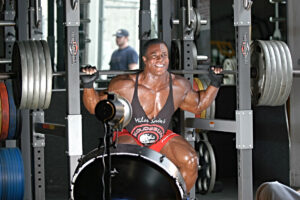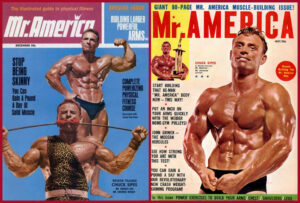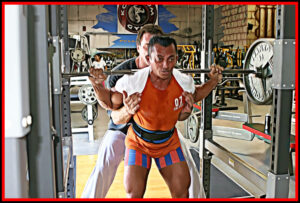
Discover the Power of Heavy Supports
Overcoming strength plateaus using partial movements
Success leaves clues, and if you want to get super strong, follow the clues left by Chuck Sipes.
Sipes captured the 1959 IFBB Mr. America title, followed by the 1960 IFBB Mr. Universe. In 1967, he took second in the IFBB Mr. Olympia to one of the most genetically-gifted bodybuilders in history, Sergio Oliva. At a height of 5 feet-9 1/2 inches, Sipes weighed 220 pounds and sported a 50-inch chest, 19 1/2-inch arms, and 18-inch forearms. There’s more.
Sipes was as strong as he looked. He could bench press 570 pounds and squat 600 pounds “raw,” and performed a cheat barbell curl with 250 pounds. He also had a strongman act where he would bend steel bars in his teeth. Sipes unquestionably earned his nickname, the “Iron Knight.”
 Chuck Sipes was a strongman who won the IFBB Mr. Universe and placed second in the IFBB Mr. Olympia.
Chuck Sipes was a strongman who won the IFBB Mr. Universe and placed second in the IFBB Mr. Olympia.
Sipes popularized heavy supports to the bodybuilding community. Heavy supports were often used by weightlifters when the standing Olympic press was contested – it was removed from competition after the 1972 Olympics.
Among the type of heavy supports weightlifters performed to help their pressing was to set pins at various heights to work on specific points of the lift. Powerlifters would also perform heavy supports for their bench press and their squat. One of the benefits of heavy supports is that it gives an athlete confidence, such that when they perform the full lifts, the weight feels lighter.
Sipes claimed heavy supports increased the strength of the tendons. The Strength Sensei believed the heavy supports heighten the Golgi Tendon Organ (GTO) shutdown threshold, a tension/stretch receptor in the tendon. He said the GTO inhibitory effect could be seen during arm wrestling. When the GTO senses excessive stress that could tear muscles, it will shut down the muscles, and the weaker opponents arm will slam against the table.
One of the Strength Sensei’s favorite methods of heavy support training was to intersperse 8-second isometric holds between regular sets. Here is an example of one of his workouts, performed in a power rack with a spotter:
Set 1: Full squat, 5 RM (repetition maximum) at 85 percent of max, rest 180 seconds
Set 2: Heavy support, 8 seconds at 200 percent of max – in other words, twice your max for one rep. Rest 180 seconds. This lift is a 1/16th isometric squat, unracking the weight and holding an upright position with your knees slightly unlocked. At the end of 8 seconds, the Strength Sensei said your knees should quiver.
Set 3: Full squat, 5 RM at 85 percent of max, rest 180 seconds
Set 4: Heavy support, 8 seconds at 210 percent of max, rest 180 seconds
Set 5: Full squat, 5 RM at 85 percent of max, rest 180 seconds
Set 6: Heavy support, 8 seconds at 220 percent of max, rest 180 seconds
 Heavy supports should be performed in a power rack with a spotter. (This and the lead photo by Miloš Šarčev)
Heavy supports should be performed in a power rack with a spotter. (This and the lead photo by Miloš Šarčev)
Want to break through training plateaus and get super strong? Follow the lead of the legendary Chuck Sipes and give heavy supports a try! (TSS)
